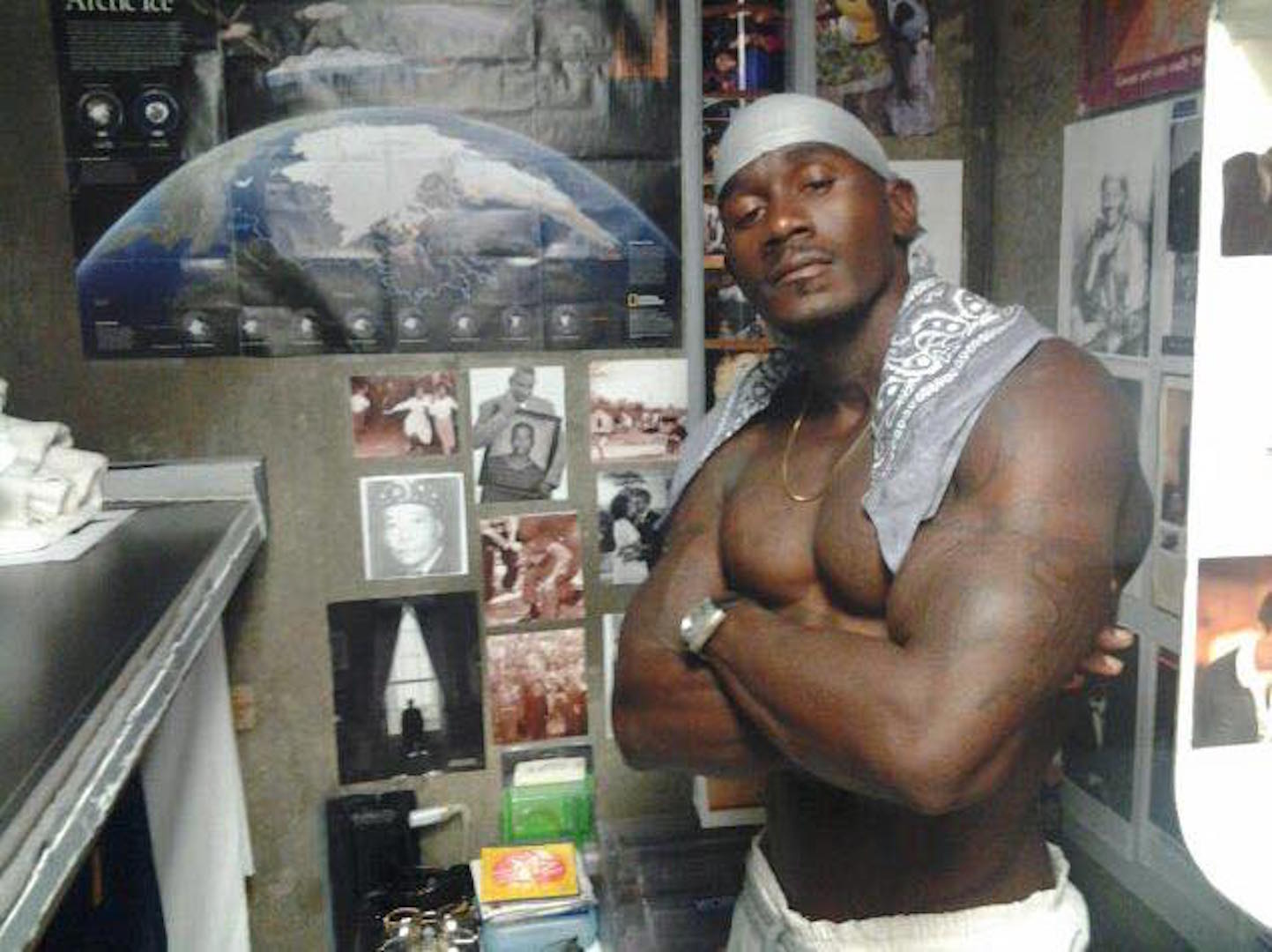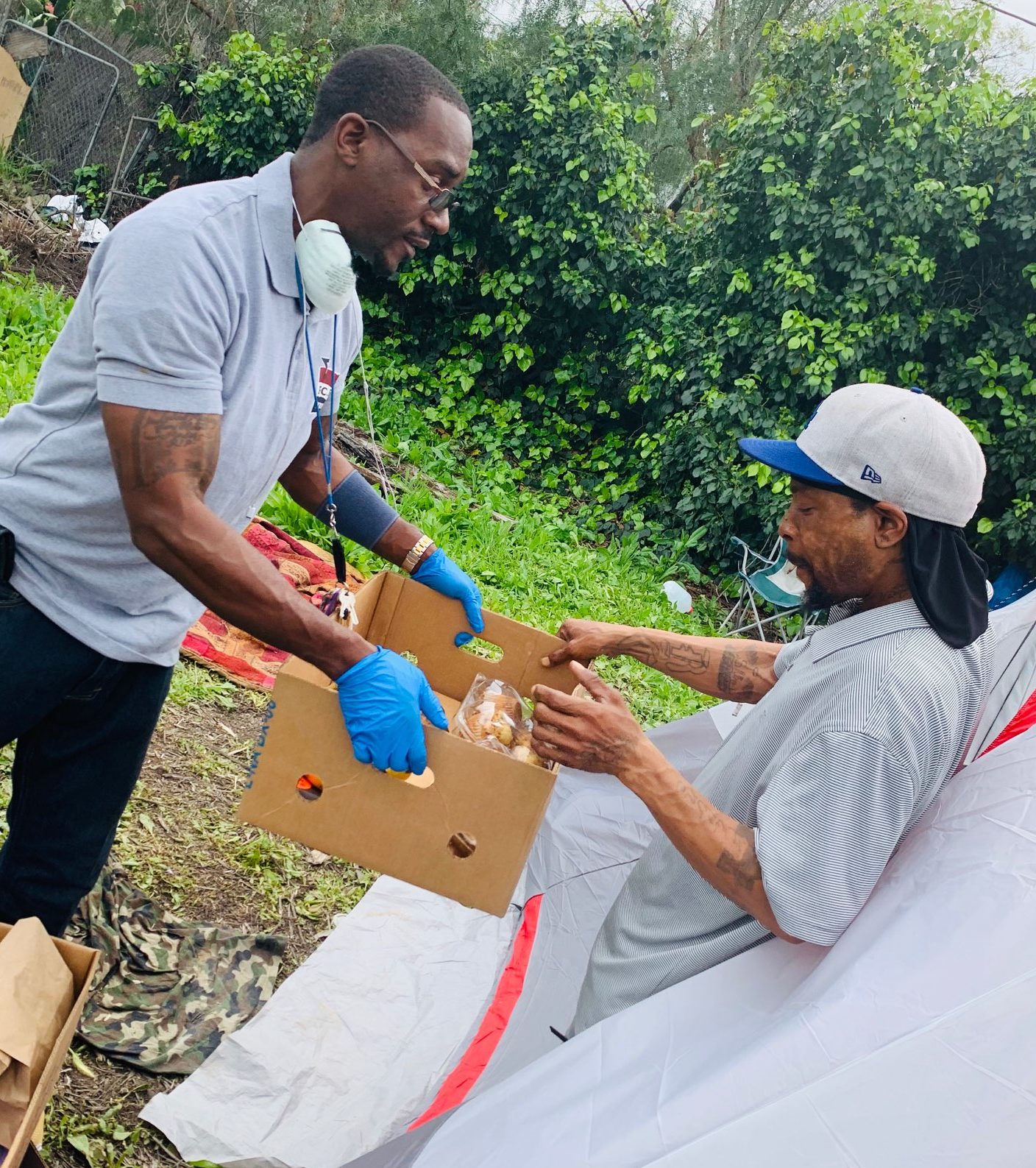
Former Crips gang member Gernay Quinnie Jr. turned his life around after 19 years in prison and is now helping the homeless in a rival gangs' neighborhood.
By Heather Newgen
The Bloods and the Crips have a longstanding violent history and deadly rivalry that stems back to the 70s. Both street gangs originated in South Central Los Angeles and are nationally known for their vicious crimes, but for Gernay Quinnie, it was never a question of which gang he would join.
"My family associated with the Crips and that played into my decision of which side I was going to play on. My dad was a [Rollin] 90 Neighborhood Crip and my mom was a 111 Neighborhood Crip."
But Quinnie's dad didn't stick around for long. When he was just 7-years-old his father left and he hasn't seen him since. His mom struggled to raise Quinnie and his older brother, and it was "in a way expected" for him to join the gang.
"I can only speak for African Americans, but most join out of necessity, especially for males. When you look out into into the environment, you look for the strongest male figures and you can't help but notice these gang members who are out there boldly standing up to the police, or boldly standing up against another person. That becomes the man's figure. Because men have been removed out of the homes, or not allowed in the homes because of their inharmonious backgrounds, that entirely goes to us looking at these [guys] as the men in the community. You get influenced by imitation," Quinnie, 38, told The Voluntourist.
He added, "I was coming out of poverty. There was economic opportunities [to being a Crip]. I was jumped in at 13-years-old, but there was a little bit of a twist because I already had a gang started in my apartment building. So I brought them 12 recruits and that gave me status in the gang."
 Gernay Quinnie helps a friend who "jumped him" into the Crips when they were kids
Gernay Quinnie helps a friend who "jumped him" into the Crips when they were kids
As a Crip, Quinnie committed several robberies, but at 14 he was involved in an armed robbery that went wrong in the West Athens neighborhood of South Central. His partner and best friend was shot and killed, and Quinnie was shot in the face.
"As a result of his death I had to ride the beast. His murder was on me because we were accomplices. Anything that happens in the commission of the crime falls on equal partners. Patrons and police were shooting back at us as we attempted to rob the store," the former Crips member said.
He served time in jail and would have been released when he was 25, since he was a juvenile. However, when he was 18-years-old, he successfully escaped prison and was free for over two weeks until he was captured. He then had to serve another few years and spent a total of 19 years imprisoned.
"I didn't see my mom the whole time I was incarcerated. There was a big disconnect between me and her. My grandmother was my staunch supporter. She had passed away and I ended up going to a crazy house in prison and that's where I actually found myself. It was at the lowest of the low for me. I'd seen what I become and I'd seen what I was doing to myself. I knew I had enough intelligence at this point to change because I was an avid reader. It was me being confronted with extremes. I was there for a year seeking help for depression and suicidal ideations as a result of this lack of value I had on my life."
The big turning point for Quinnie was learning the story of Joseph in the Bible, which he instantly resonated with.
"His story connected with mine--being outcasted from your family. He was sold into a situation where he was almost a slave. His whole situation addressed the anatomy of human behavior. Within that I started to extract lessons from his life and how I could apply it to mine," he explained.
He was so taken with Joseph that he started teaching other prisoners about him and called it The Joseph Project.
"It's a narrative therapy based science and that's what really changed my life."
Quinnie was released from jail in 2017, has been reunited with his mom and "retired" from the Crips after 20 years.
"I gained the respect of my peers who allowed me to go and do my own thing. In doing my own thing, I turned things around and started doing some improvements to my neighborhood. That's how I really got the respect and how they respect us older guys who are now getting out of the game. They respect us if we take that step and then add something to what we actually stepped away from," he said.
He's now giving back to the homeless in underserved areas of LA and is trying to help them through the coronavirus pandemic, even if that means going on another gangs turf. The Bloods and the Crips have been notoriously feuding for decades, but Quinnie worked out a temporary cease fire so he can enter their territory without issue. But that doesn't mean he isn't fearful.
"Everybody is disguised now [with masks due to COVID-19] and that intimidates me. Before I knew who guys were and I could see things coming. I'm more afraid of getting shot than I am of catching COVID-19. I go out there on a wing and a prayer every day. What I'm doing is nonsense to people out there on the street. So I have to make it make sense to them when they come up to me."
Quinnie visits the roughest parts of LA every day handing out food and trying to educate homeless communities about coronavirus.
"People respect, but they don't understand the full scope of it because as far as the gang life is concerned, it's too soft. 'We respect you and we know what you used to be, but this, what you're doing is too soft, but give me some food at the same time,' he admitted. "It's a mixture on that end, but as far as the community, I cut their grass, I fix their door, I go shopping for the neighbors, I protect the neighbors and check on them. I do what the men in the community was originally designed to do."
The food he distributes is donated by Pastor John Hernandez from New Challenge Ministries and Quinnie is working in partnership with WordsUncaged, an organization that empowers currently and formerly incarcerated people through arts and education, as well as R.A.C.E.(Reclaiming American's Communities through Empowerment), which helps prevent gang and youth violence.
"The areas I've been in are ones people don't go in to help. The homeless are literally left out to dry on this," he said. "Sometimes I'm out until 10:00 p.m. at night still feeding. They say, 'Man, are you coming every day?' Even the ones that are tough and control their little camps, you see them eating the food. I'm forming a relationship with them. I know their names, personalities and what they're going through. They're human beings, They just made a mistake," Quinnie continued.
If you'd like to help, volunteers to sort and deliver food are always needed. You can reach out to Quinnie on his personal Facebook page. If you'd like to make a donation click here.
You can also drop off canned goods and non perishable items to 1732 W. 111st Los Angeles, CA. 90044.
